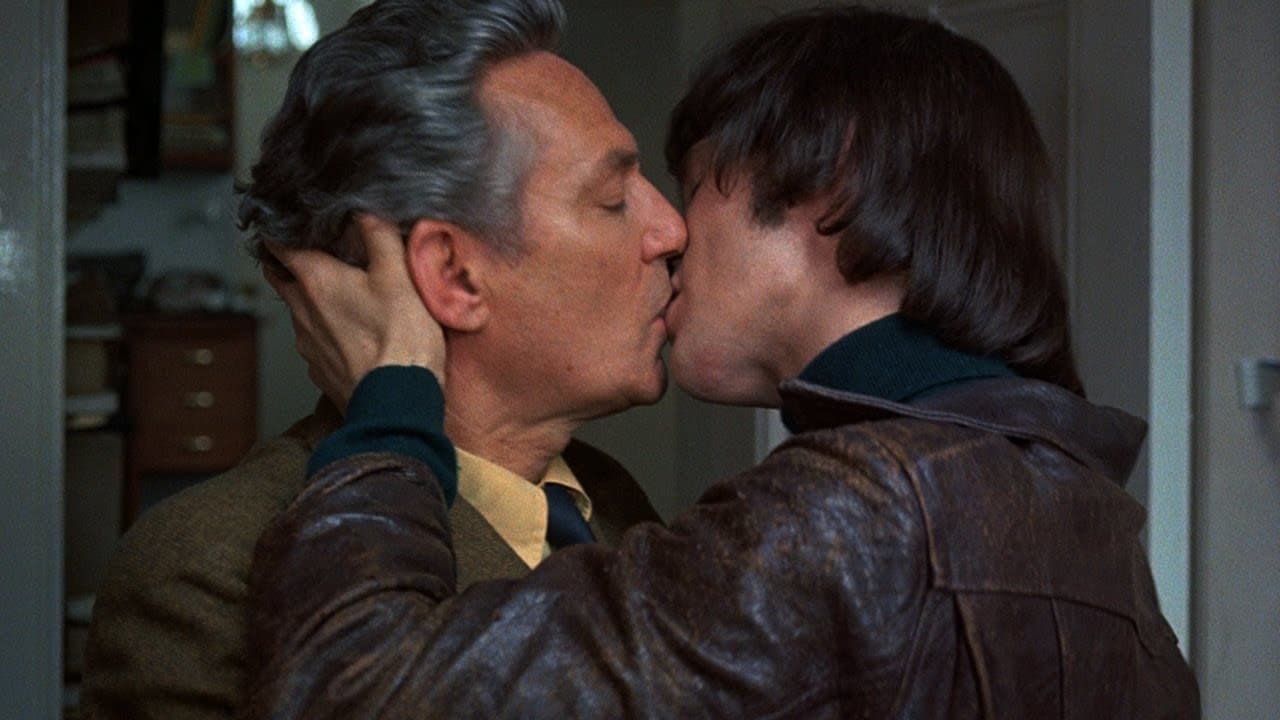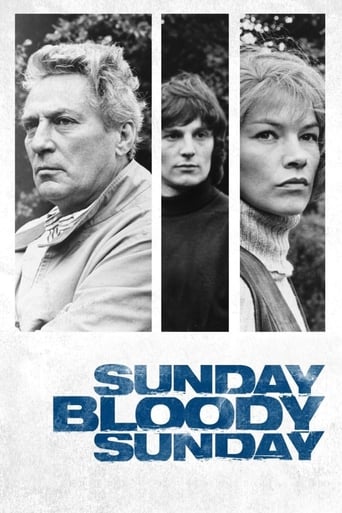Incannerax
What a waste of my time!!!
Exoticalot
People are voting emotionally.
Neive Bellamy
Excellent and certainly provocative... If nothing else, the film is a real conversation starter.
Erica Derrick
By the time the dramatic fireworks start popping off, each one feels earned.
Syl
Glenda Jackson's Alex Greville and Peter Finch's Dr. Daniel Hirsch are better together than apart. Their characters share a lover played by Murray Head. The cast is first rate with Jackson and Finch playing their characters perfectly. It would have been more interesting to see them together on screen than with Head's character, Bob. They share a lover, Bob. Both Alex and Daniel are more mature in age. Alex fears loneliness while Daniel must deal with his homosexuality. I hated the scene in the park with the kids, Alex, and Bob. The dog's death was entirely unnecessary in my opinion. Alex and Bob spend a weekend with a couple's five obnoxious kids. I love the London scenery in the background. Daniel is a British Jewish doctor who has a successful practice. His family can't grasp or see why he's not married or attached to a woman.
ricbigi
I saw Sunday,BLOODY Sunday when it came out and own it in DVD format. Being born in 1949, I feel totally in touch with this story, its characters, and the superb way John Schlesinger translated it into film. I have seldom seen such a deep, adult treatment of human relationships. SBS is particularly sensitive to the smallest details of what it means to live and love in our times. The Penelope Gilliatt screenplay is so masterful in showing the many aspects of the personal universe of each character that every emotion is perfectly rendered, balancing dark and light moments in just the right way. Peter Finch, Glenda Jackson,Peggy Ashcroft and Bessie Love are a joy to watch, to say nothing of the other actors, all splendid. I treasure this film.
jzappa
John Schlesinger's Sunday Bloody Sunday is social realism, as seemingly unusual as its scenario is and however much poetic license the script and direction take. Yes, it defies all perceived social convention. We follow a triangular sexual relationship comprised of a man and a woman, both middle-aged, and another man, much much younger. There is a scene where young children innocently smoke a joint after breakfast, because they know where their out-of-town parents keep it. But the lack of permanence implicitly shown in mercilessly intimate scenes of parties, workplace conflicts, doctors' appointments, bar mitzvahs, et al, are concerned with the politics of the personal rather than the traditional. It's an exploration of characters at crossroads in their lives, those roads intertwined.The screenplay by Penelope Gilliatt takes us through eight or nine days, while a young man, played very becomingly by British singer Murray Head, plans to leave for New York. Both of his lovers will miss him, and I guess he will miss them, in his own way, yet he has chosen to go, and between them, they don't entice him enough to make him want to stay. So the two love affairs begin their dissolution, while the lovers go about a moody everyday life in a London mostly comprised of frigid twilights. An aria from Mozart's comic opera Cosi fan Tutte is played on the soundtrack with ironic detachment. And then there is Mendelssohn's utterly romantic On Wings of Song, its minor key tonality embraced.Both the doctor and the woman are concerned with helping people, he by an altruistic and astute way with his patients, she through working in an employment agency. The boy however gives the impression of being solely absorbed in the marketing possibilities in America for his ultra-modern sculpture. He isn't even worried whether his stuff is any good, but whether it will sell to Americans. Indeed, he doesn't appear to feel very intensely about anything. He is nice enough and open enough, but there is no range to him, as there is to his lovers.Played with perfect pitch in deservedly Oscar-nominated performances by both the great Peter Finch and Glenda Jackson, it is with these two older characters that we get to the nerve center of the story. They survive in a lose-lose world by adjusting themselves to life as it must be lived, such as how Finch, the doctor, not at all internally bothered by his homosexuality, doesn't disclose it to his opaque Jewish family. Continuing fraternization as usual with them is another way for him to survive. Jackson says late in the film, "Some people believe something is better than nothing, but I'm beginning to believe that nothing can be better than something." Well, possibly so, but we get to know her well enough to reckon that she will shake on something, not nothing, once more the next time.That they're inclined to share him is maybe a tell: They share him not because they're inclined to accept half, but because they're apprehensive about going for all. The three-sided understanding is somewhat an assurance that no one will get in so far that being refined won't be barrier enough against heartbreak. It's the ultimate moral dichotomy in liberalized society: The philosophy of whatever works, but that can hurt people. Yet don't people suffer when bound by convention too? We are free to do what we want, but then people still choose to do what they don't want to do at all.Look at the scene where the young man and his female lover, who is watching her friends' children, and they have a fun time in a park by a church, which unexpectedly and senselessly leads to a tragic accident involving their dog: The kids are all having happy reckless fun, but there are casualties. The little girl disobeys, but she's a little girl in the throes of fun. Her dog's accident is nevertheless her fault. With pleasure, blameless or not, there is always pain, intended or not.
Lechuguilla
Beyond the obvious nonconforming romantic relationships, I cannot see that this film has much of a point. Maybe I'm just not that interested in the characters. They are boring, and their tedious lives seem dull and drab. Dr. Hirsh (Peter Finch) is stiff and starched. Alex (Glenda Jackson) at least expresses some emotion, but she is far too accepting of her dilemma. And Bob Elkin, gigolo artiste, has all the emotional depth of a slab of concrete. Why would Dr. Hirsh and Alex put up with someone like that? The plot would be stronger if Dr. Hirsh and Alex had more screen time with each other, various confabs, to rev up the story's conflict.The script places way too much emphasis on day to day routines, that contribute little or nothing to the story's bisexual, experimental theme. For example, the redundant switchboard operator scenes come across as filler. And I never did see the point of the scenes with all those children. Such story contrivances extend the film's runtime way beyond its thematic value. As a result, the story is loose and lacks focus, basically just a day-in-the-life-of saga. The film's pace is excruciatingly slow.About the best that I can say for this film is that the performances of Peter Finch and Glenda Jackson are quite good. And the film's production design is lavish.I suppose that in its day the film's theme was considered daring. But "Sunday Bloody Sunday" has not aged well. By today's standards, its theme is tame, and that makes all that perfunctory, day-to-day behavior the characters engage in, just that much more bland and boring.

